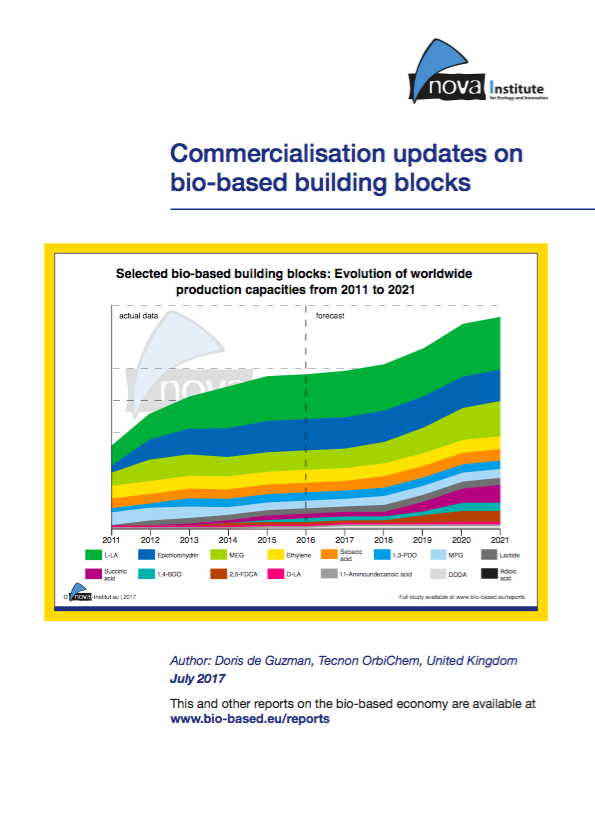With the many shifts in economic and political trends over the last year, many bio-based investments are focusing on the core of the Bioeconomy: bio-based building blocks and platform chemicals. nova-Institute’s preliminary market study “Bio-based Building Blocks and Polymers – Global Capacities and Trends 2016–2021”, reports on seventeen building blocks with an estimated total production capacity of 2.4 million tons in 2016, expected to reach 3.5 million tons in 2021, and with a CAGR of 8%.
Commercialisation and development of these novel building blocks are discussed in more detail in the new nova Institute trend report, “Commercialisation Updates on Bio-Based Building Blocks”. The rise and wane of the markets for several established bio-based building blocks are also discussed fully including various technology processes, feedstock usage, supply/demand, and pricing whenever available for both incumbent petrochemicals and their bio-based chemical alternatives. Both reports are available at www.bio-based.eu/reports
Although robust growth is still anticipated, major industry restructuring continued in 2016 as the development and commercialisation of bio-based building blocks responded to continued low crude oil and petrochemical prices, prevalent since late 2014. The development and commercialisation of drop-in bio-based commodity chemicals such as those targeting ethylene and propylene-based derivatives have been impacted particularly hard. The contract price for ethylene in the US dropped sharply from an average of $1,062/ton in 2014 to $673/ton in 2016. The average price for US propylene also declined dramatically from $1,530/ton in 2014 to $732/ton in 2016. This has led companies such as Braskem and Dow Chemical to shelve their bio-based propylene development projects, while Mitsui abandoned its sugarcane-based ethanol joint venture with Dow Chemical in Brazil, which had aimed to build a future ethanol-based polyethylene manufacturing facility to compete against Braskem’s 200,000 tpa Green PE plant in Brazil.
After more than two years of crude oil prices remaining at around $50/bbl, several renewable chemical companies and investors have started rethinking their growth strategies, especially those who have invested R&D in drop-in bio-based chemical alternatives to commodity petrochemicals.
One positive note is that interest in the potential beneficial properties of novel bio-based building blocks. Even oil companies such as Total, Neste, Tesoro, Chevron and American Refining Group as well as petrochemical companies, whose profits have been affected by low crude oil and petrochemical prices, are looking to expand their portfolios to include potential applications of these novel building blocks in specialised, higher-value, smaller-volume markets.
While it might take more time and investments to develop the markets for novel building blocks, increased interest in synthetic biology and the development of new catalyst technologies are helping these new products to enter the commercial market faster, with the aim to fill some of the requirements that petrochemical-based ingredients were unable to do at cost-economics and in a more sustainable fashion.
Below we have summarised the progress and slow-downs in the development and commercialisation of several bio-based building blocks:
2017 Status of Several Bio-Based Building Blocks – Development and Commercialisation
| Chemicals | Status 2017 |
| Adipic Acid | Technically feasible, economics poor |
| Ethylene and Propylene | Bio-PE a lonely success |
| MEG and MPG | Struggling, new approaches needed |
| Epichlorohydrin | Plants built, economics now poor |
| 1,4 Butanediol | Almost there |
| Dodecanedioic acid | Bio-product triumphs! |
| 1,3 Propanediol | Bio-product has ousted petro-product but production from glycerol has stalled |
| Terephthalic acid | Several R&D approaches |
| Succinic acid | In commercial production |
| Furan dicarboxylic acid | Approaching commercialisation |
| 1,5 Pentanediamine | In commercial production |
| Lactic Acid | An old market that is getting renewed interest |
| 11-Aminoundecanoic acid | Celebrating its 70th year |
| Sebacic acid | An old but still struggling market |
| Hexamethylene Diamine | Limited R&D approach |
| Source: Tecnon OrbiChem 2017 |
 The 63-page report includes 40 figures and 12 capacity/producer/production tables for several building blocks. It is available at www.bio-based.eu/reports.
The 63-page report includes 40 figures and 12 capacity/producer/production tables for several building blocks. It is available at www.bio-based.eu/reports.
About the Author:
Doris de Guzman joined Tecnon OrbiChem in March 2013 as a senior consultant covering bio-based chemicals feedstocks for the company’s Bio-Materials & Intermediates consultancy service. Doris has been covering the business of green chemistry for more than 17 years and she is also the creator and author of the Green Chemicals Blog, which has an average 15,000 to 20,000 unique readers per month.
With its unique position covering the global chemical intermediates market, Tecnon OrbiChem has undertaken this year’s nova Institute Bio-Based Building Blocks trend report covering well-known commercial bio-based building blocks such as lactic acid, succinic acid, monoethylene glycol (MEG), ethylene, epichlorohydrin (ECH), 1,3 propanediol (PDO) as well as developing building blocks such as terephthalic acid (TPA) and 1,4 butanediol (BDO). The report also has added more building blocks coverage this year – 1,5 pentanediamine (PDA), hexamethylene diamine (HMDA), adipic acid, monopropylene glycol (MPG), dodecanedioic acid (DDDA), sebacic acid and 11-aminoundecanoic acid (11-AA).
In 2017 Tecnon OrbiChem has released its Handbook of Commercial Bio-based Chemicals, a compilation of 40 Chemical Profiles including several special reports published between September 2013 and December 2016. It is a handy collection of descriptions of the more successful endeavours to achieve or approach commercial viability for renewable chemicals and products.
About Tecnon OrbiChem:
Tecnon OrbiChem has been a leader in providing data and analysis to the petrochemical industry since 1976 and is now one of the world’s foremost marketing consultancies to the bulk chemicals, petrochemicals and plastics industries; specialising in Chemical Intermediates, Synthetic Fibres and Resins. www.orbichem.com
About nova-Institute:
nova-Institute is a private and independent institute, founded in 1994; nova offers research and consultancy with a focus on bio-based and CO2-based economy in the fields of feedstock, techno-economic evaluation, markets, sustainability, dissemination, B2B communication and policy. Today, nova-Institute has 25 employees and an annual turnover of more than 2.5 million €. www.nova-institute.com




